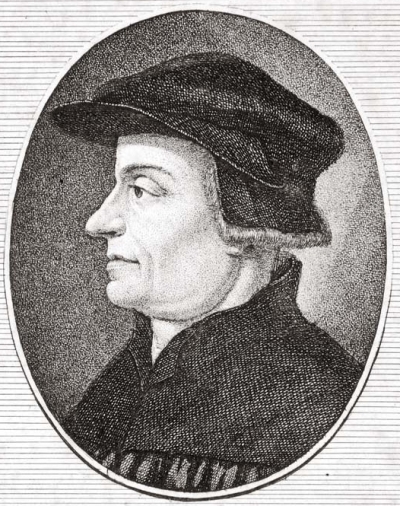CHURCH HISTORY
Church Foundations
Ulrich Zwingli
By Brandon Markette

Zwingli left Glarus in 1516, investing time in reading and learning Greek while preaching in Einsedeln. At Einsedeln, Zwingli experienced what might be called an evangelical conversion. He came to see the Bible as the sole foundation for Christian teaching and doctrine. The traditions of the church were, to Zwingli, just that — traditions. If they weren't founded solidly upon the Bible, then they weren't central to the Christian faith.
When Zwingli accepted a call to serve as the people's priest in 1518 Zurich, Switzerland, he was ready to begin the work of reformation. Because of his high view of Scripture, Zwingli began this work by first preaching systematically through the Bible. Doing so built a conviction in the people that the Bible is the foundation upon which Christian belief is built. This set the stage for the reformation in Switzerland. Having set the stage, Zwingli argued for church reform based upon what Scripture taught. He radically changed the liturgy, argued for clergy marriage (Zwingli would marry in 1523), and promoted separation from the papacy, to name just a few of his proposed reforms.
Before long, the Swiss government called for a disputation between the Protestants, like Zwingli, and the Catholics. This disputation took place at Baden in 1526. The setting for the Baden Disputation favored the Catholic position with Mass held every day in the heavily Catholic town. It is no surprise, given the conditions, that the Catholic Church won the Baden Disputation and Zwingli was excommunicated. Zwingli and his band of reformers might be down, but the reform movement was definitely not out.
Two years later a follow-on disputation was called. This time meeting in the Swiss city of Berne, the setting was as favorable to the Protestants as Baden had been to the Catholics. Over 16 days various points of disagreement were debated. Like Baden for the Catholic Church, the Berne decision strongly favored the Protestants. Thus Switzerland became a Protestant nation. Of course, as one might expect, the decision at Bern did not engender immediate change throughout Switzerland. Most notably, five heavily Catholic cantons (a canton is like a county) opposed Berne and fomented for war. But war would have to wait.
Luther had his 95 theses, and Zwingli his 67 articles. These 67 articles contained his critique of the Church and call to reformation. Though both men sought to radically reform the Church, Luther and Zwingli did not see eye-to-eye. Specifically the men did not agree on the Lord's Supper. Both criticized the Catholic Church's understanding of this sacrament, but they did not agree among themselves. In the interest of unity among Protestants, Prince Hesse invited both men to the Colloquy of Marburg in 1529. His desire was to see the two reformation movements working together as one. To achieve this, the two parties would have to come to agreement on their areas of dispute. Unfortunately, no such agreement was achieved.
Though war in Switzerland was averted in 1528, the specter rose again in 1531. This time the same five cantons rapidly descended upon Zurich and were met at the battle of Cappel. As in earlier wars, Zwingli served as a Chaplain to the soldiers. As their chaplain he carried their flag into that battle and fell. Though his life was cut short in combat, Zwingli's influence continued and became the foundation for reformed churches worldwide.
Image Source: Ulrich Zwingli by Hans Asper; Public Domain
Tags: History-Apologetics | Political-Issues | Theological-Beliefs
comments powered by Disqus
Published 6-14-2014

